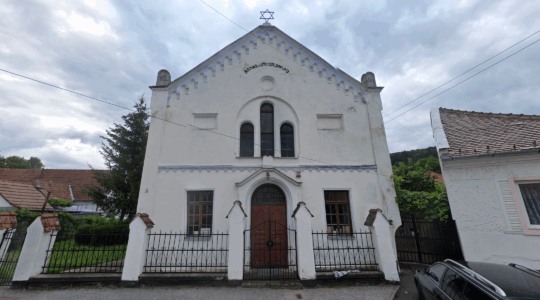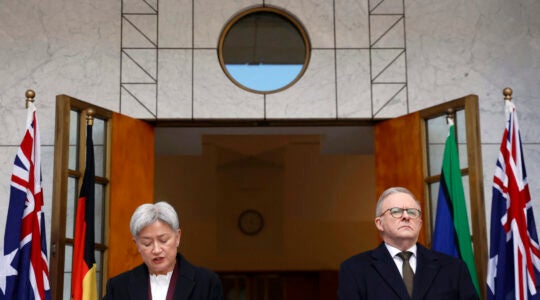
A still from “Fitna,” a film that labels Islam an inherently violent religion. ()

Teens of Pakistani heritage at a Muslim youth center in Bradford say they are regularly called terrorists by their classmates because of their religious and ethnic background. (Dinah A. Spritzer)

In a still from “Fitna,” a film produced by Dutch Parliament member Geert Wilders, an Islamic man is shown speaking about the religion’s thirst for power. ()

The Jamia Mosque in the United Kingdom was vandalized last December in one of many anti-Muslim acts that nongovernmental agencies say is a growing problem in Europe. (The Muslim News)
BRUSSELS (JTA) — A bus driver on Antwerp’s line 19 doesn’t like Muslims.
Such is the warning friends gave 24-year-old Meryem, a Belgian Muslim of Moroccan descent, advising her to avoid the driver’s route.
But last summer Meryem, who wears a headscarf, forgot her friends’ caution and boarded the bus to Deurne.
After a few minutes, the bus made a stop where two passengers, an elderly Belgian gentleman and a woman wearing a Muslim headscarf, were waiting. The man boarded the bus first. As the woman lifted her foot to follow, the driver quickly slammed the door shut and sped away. The woman appeared shocked, recalls Meryem, who asked that her last name not be used to protect her privacy.
“A few weeks later I took Bus 19 again and it had exactly the same driver, who this time did not even stop to pick up a bearded man who appeared to be a Muslim at one of the bus stops,” she told JTA.
Meryem’s experience illustrated what has become a catchword in European government and academic circles: Islamophobia — the fear, hatred, discrimination or negative stereotyping of Muslims.
Ranging from physical attacks to verbal abuse to subtle discrimination, Islamophobia has become a leading form of xenophobia in Europe, according to numerous European government studies.
“The notion that the presence of Islam in Europe, in the form of its Muslim citizens and migrants, is a challenge for Europe and European norms and values has taken a strong hold in European political discourse and has also created a climate of fear,” said a 2006 report, the European Union’s first study documenting Islamophobic incidents.
In Europe, Islamophobia is inextricably connected with anti-immigrant sentiment, since most of Europe’s Muslims are immigrants or descendants of immigrants. The terrorist activities of radical Islamic groups have compounded the negative views some Europeans already held of Muslims, who represent a rapidly growing segment of Europe’s population that is statistically poorer and less educated than native Europeans.
Capitalizing on this demographic trend and fears of terrorism, far-right political parities have painted Muslims as an alien group that threatens the European way of life.
In 2007, the Swiss People’s Party campaigned with posters showing veiled Muslim women and the question, “Where are we living, Baden or Baghdad?”
Experts are divided over whether race, socioeconomic status or association with terrorism is at the root of Islamophobia in Europe. What is clear is that antipathy in Europe toward Muslims has grown in tandem with terrorist attacks such as the 2005 London transit bombings and the 2004 Madrid train bombings.
Mosques in Germany have been torched. Muslim graves in London have been vandalized. And all over Europe, North African immigrants and their families have been subject to verbal and physical attacks, sometimes by neo-Nazis.
In the months after the 2004 murder by an Islamic extremist of filmmaker Theo Van Gogh, whose films had criticized Islam’s treatment of women, there were 47 violent attacks against mosques in the Netherlands.
Some argue that Muslim fundamentalists exploit the charge of Islamophobia to silence legitimate criticism of Islamic fanaticism, including honor killings, forced marriages and sympathy for terrorism.
“In Denmark, if you speak out against forced marriage, Islamists say you are Islamophobic,” Nasser Khader, a member of the Danish Parliament who describes himself as a secular Muslim, told JTA. “I think it’s OK to have Islamist-phobia. Islam as an ideology can be fascistic.”
Khader said Muslims should face up to the fact that they are sometimes to blame for anti-Muslim sentiment.
“One month after 9/11, about 1,000 fanatical Muslims in Denmark held a rally to celebrate Osama bin Laden, only five weeks before the general election in Denmark,” he said. “The demonstrators gave the extreme right five more seats in the parliament.”
In 2006, the author Salmon Rushdie and the former Dutch legislator Ayaan Hirsi Alli called Islamism a “totalitarian global threat” and wrote that they would not be cowed by “the fear of being accused of ‘Islamophobia,’ a wretched concept that confuses criticism of Islam as a religion and stigmatization of those who believe in it.”
Meanwhile, there is growing evidence of European hostility toward Muslims. Last September, the Pew Research Center released a study that found unfavorable attitudes toward Muslims in the European countries with the largest Muslim populations. Of those surveyed, 52 percent in Spain, 50 percent in Germany, 38 percent in France and 25 percent in Britain registered negative attitudes toward Muslims. By contrast, a 2006 Pew Research Center survey in the United States found 25 percent of respondents had negative attitudes toward Muslims.
Traditionally much more ethnically homogeneous than the United States, Europeans have been slower to accept the estimated 17 million Muslim immigrants in their midst.
In Switzerland, some second-, third- and even fourth-generation immigrants do not hold citizenship. Unlike the United States, not all European countries automatically grant citizenship to natural-born residents. Up to 50 percent of Europe’s Muslims are not actually citizens of E.U. countries, analysts estimate. Some have not taken citizenship of their own choice.
“Europe’s small, culturally homogeneous nations still find it difficult to extend a warm welcome to immigrants who, for their part, tend to retain native languages and customs, clustering in small enclaves with compatriots,” Shada Islam, senior program executive at the European Policy Center, a Brussels think tank, wrote recently in YaleGlobal Online.
Meryem says hostility toward Muslims is not reserved for immigrants.
“We used to be hated because we were foreigners; now it’s also because we are Muslims,” Meryem said. In Europe, “you can be fourth generation and you are still considered an immigrant, a foreigner.”
Muslims first began immigrating to Europe in earnest in the 1960s, when guest workers from North Africa and the Indian subcontinent — former European colonies — as well as Turkey helped make up for a shortage of blue-collar laborers. Instead of returning to their native countries, the workers stayed on.
Muslims now comprise about 5 percent of Europe’s population (excluding Turkey), and they have birthrates that are two to three times the European average.
Complaining about Muslims has become a common and acceptable part of public discourse in Europe, fueling anti-Muslim political parties.
In Belgium, the leaders of the Vlaams Belang (Flemish Interest) party openly deride Islam, lamenting the country’s “mushrooming of mosques” and the “Muslim invasion,” and warning that it’s only a matter of time before non-Muslim women are forced to wear burkas. The party doubled its representation on local councils in the 2006 municipal elections, and in 2007 it received 12 percent of the national vote, making it Belgium’s third largest party.
Austria’s Freedom Party, which also has a record of anti-Muslim rhetoric, grew to 17 percent in 2008 from 11 percent in 2006.
Last year, Dutch member of Parliament Geert Wilders released a controversial 17-minute film called “Fitna” — Arabic for a “test of faith” — that links Islam to terrorism. Wilders said he made the film as a wake-up call “to shake off the creeping tyranny of Islamization.”
Some scholars see racial bias at the root of Europe’s often troubled relationship with its Muslim minority.
“The fact that Muslims in France are blacks and Arabs is critical to how they are perceived in French society, not their religion,” said Justin Vaisse, a senior fellow at the Brookings Institution in Washington and co-author of the book “Integrating Islam.”
In France, which has the largest Muslim population in Western Europe, estimated at 10 percent, or nearly 6 million people, most Muslims have roots from North Africa and, to a lesser extent, East Africa. Discrimination against them in employment and housing is race-based, Vaisse suggested.
Although there are countless Muslim success stories in Europe, particularly in Britain, which has a large Muslim middle class, most European Muslims occupy the bottom socioeconomic rungs of society, where poverty and crime rates are high.
Clara Marina O’Donnell, an analyst at the London-based Center for European Reform, says the lower financial achievement of Muslims in some countries has made them a scapegoat for xenophobic political groups.
“There is a noticeable fear of immigration due to the economic climate, even though we are talking about people who have lived in Europe for decades,” O’Donnell said. “Extreme-right parties exploit that fear and use anti-Islam rhetoric as a stand-in for pure racism.”
However, O’Donnell notes, most mainstream politicians are careful not to offend Muslims. In February, Britain’s home secretary went so far as to deny Wilders entry into Britain for fear that his visit would cause social unrest. Wilders was turned around at Heathrow Airport.
Sami Zemni, a Muslim political science professor at Belgium’s University of Ghent, said the focus in Europe on Muslim fundamentalists has created a distorted view of the Muslims who live on the continent.
“There are days-long debates by European lawmakers on whether women should be allowed to wear burkas when there are like 10 women per country actually wearing them,” he said.
Just as anti-Semites think there is a stereotypical Jew, Zemni said, those hostile to Islam think there is a stereotypical Muslim.
Sometimes, he said, when he explains to people that “I don’t believe in stoning adulterers or conducting a holy war, they don’t believe me, or they say I am a self-hating Muslim.”
Weary of being stereotyped as religious fanatics or potential terrorists, more than a few middle-class Muslim professionals have left Europe for jobs in the Persian Gulf states. But most have learned to live with the negative image reflected back at them through personal encounters, political discourse and the media.
At a Muslim community center in Bradford, Britain, four teenage girls of Pakistani heritage told JTA that they’ve grown used to being called terrorists by classmates, who give them nicknames like “bin Lady,” a play on bin Laden.
“I just laugh at it,” says Kuaran Javid, 15. “I am so used to it, I don’t even notice.”
But this sort of discrimination can have dangerous consequences, warns Navid Akhtar, director of the Forum Against Islamophobia and Racism in London. Radical groups seek to capitalize on the alienation of young adults who have suffered from years of casual racism, recruiting young Muslims to radical causes.
“The al-Qaida narrative is that Muslims are despised and hated by the West,” Akhtar said. “If you live in Bradford and you tend to spend most of your time with people of your own ethnic background, you might be more likely to buy into that narrative.”
JTA has documented Jewish history in real-time for over a century. Keep our journalism strong by joining us in supporting independent, award-winning reporting.





